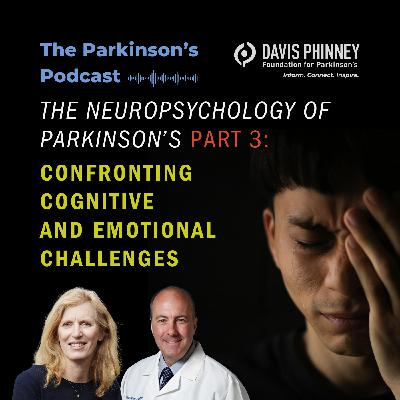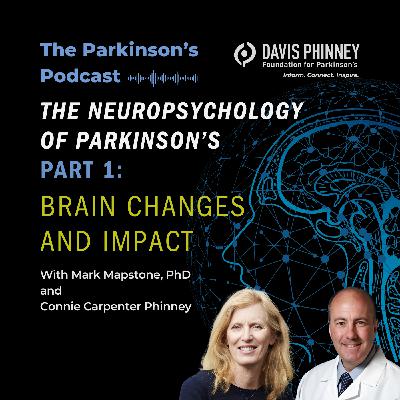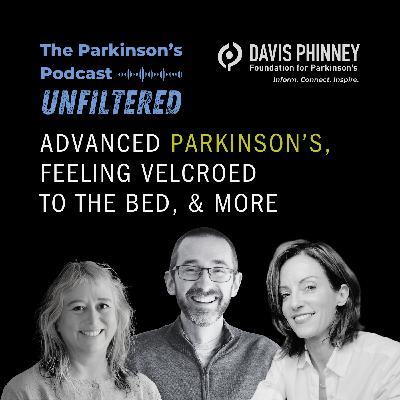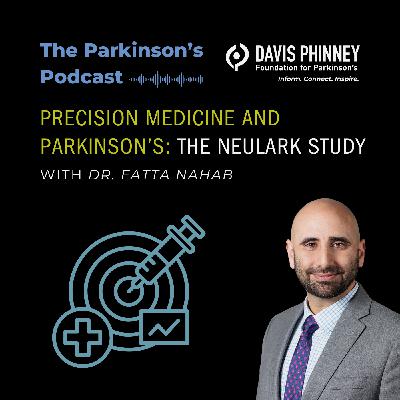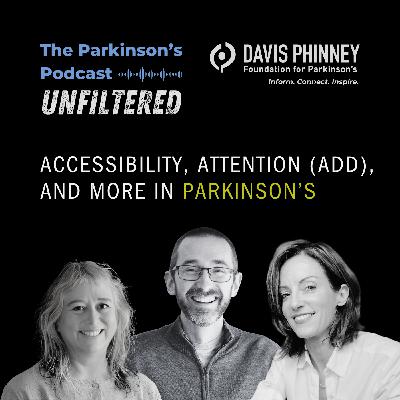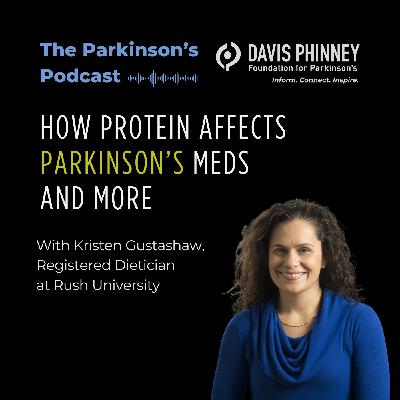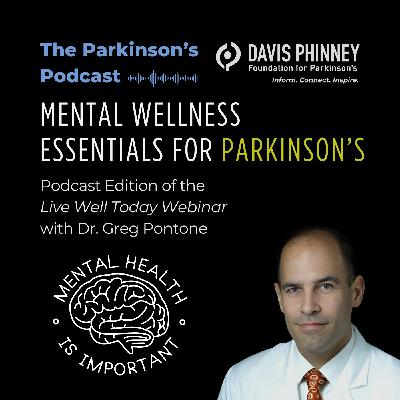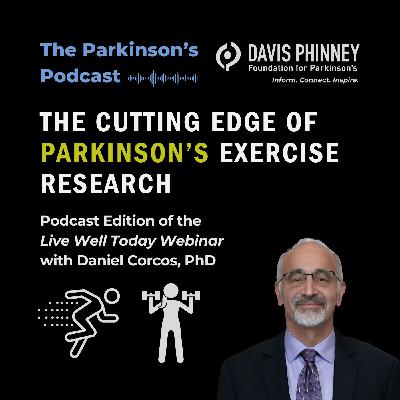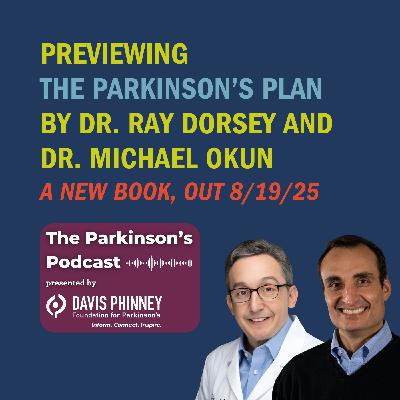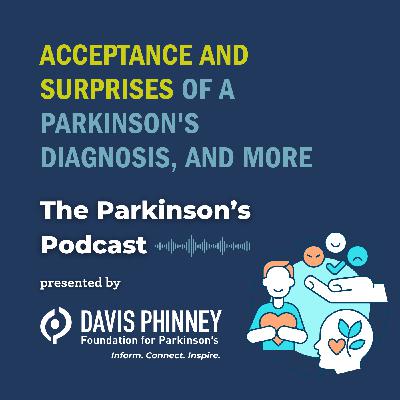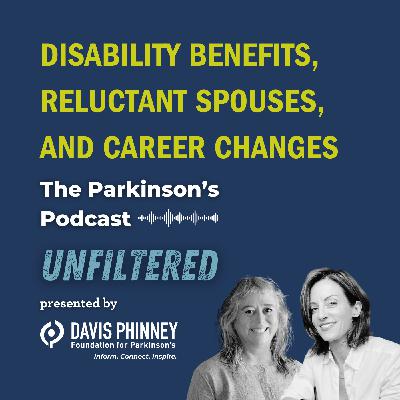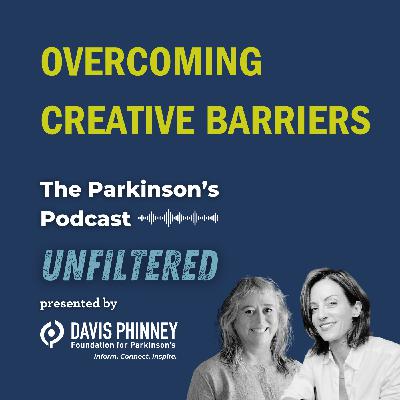Discover The Parkinson's Podcast
The Parkinson's Podcast

The Parkinson's Podcast
Author: Davis Phinney Foundation
Subscribed: 244Played: 4,122Subscribe
Share
Description
This podcast is for people with Parkinson's, Parkinson's care partners and Parkinson's providers. You'll hear from movement disorder specialists, neurologists, psychiatrists, physical and occupational therapists, complementary therapists, people with Parkinson's and Parkinson's care partners on how to live well with Parkinson's today.
223 Episodes
Reverse
Sign up for updates on webinars, events, and resources for the Parkinson’s community—delivered to your inbox. https://dpf.org/newsletter-signup In the final episode of this three-part series, Connie Carpenter Phinney and Dr. Mark Mapstone explore the emotional and cognitive changes that can occur as Parkinson’s progresses. They talk openly about issues like apathy, anxiety, executive function decline, and how these changes can affect relationships, communication, safety, and daily life—including decisions around driving and independence. While the conversation acknowledges grief, frustration, and loss, it also offers insight, practical advice, and strategies for living well through change. This episode is for anyone facing or seeking to understand the emotional and cognitive realities of Parkinson’s—people diagnosed, care partners, and clinicians alike. Connie Carpenter Phinney is a co-founder of the Davis Phinney Foundation and has been her husband’s care partner for over 25 years. Her background in science combined with her lived experience and curiosity helped shape this conversation with neuropsychologist Dr. Mark Mapstone. Connie is the host of the Foundation’s Care Partner Meetup, a monthly virtual meetup for Parkinson’s care partners held the first Tuesday of each month. To attend the meetup, sign up here: https://davisphinneyfoundation.org/events/parkinsons-care-partner-meetup/ Dr. Mark Mapstone is Professor of Neurology at the University of California, Irvine School of Medicine. He is a member of the UCI Institute for Memory Impairments and Neurological Disorders and a Fellow of the UCI Center for Neurobiology of Learning and Memory. His research focuses on pre-clinical detection of neurological disease using cognitive tests and biomarkers obtained from blood. He has a special interest in developing strategies to maintain successful cognitive aging. In the clinic, he specializes in cognitive assessment of older adults with suspected brain disease. Dr. Mapstone earned a PhD in Clinical Psychology at Northwestern University and completed fellowship training in Neuropsychology and Experimental Therapeutics at the University of Rochester. He received a Career Development Award from the National Institute on Aging and his research has been funded by the National Institutes of Health, the Michael J. Fox Foundation, and the Department of Defense. This content is possible thanks to the generosity of our listeners. Every day more people are diagnosed with Parkinson’s, and this means our work is more important than ever. Please support our work by visiting https://dpf.org/donate. Interested in our Living with Parkinson's Meetup, Care Partner Meetup, or Live Well Today Webinars? Learn how to join. https://dpf.org/webinars
Sign up for updates on webinars, events, and resources for the Parkinson’s community—delivered to your inbox. https://dpf.org/newsletter-signup In this episode, Connie and Dr. Mapstone dive into the role of neuropsychology in Parkinson’s care. They explain what a neuropsychological evaluation is, what to expect during an office or virtual visit, and how results can help guide treatment, daily planning, and care strategies. This episode also discusses why someone might be referred, how testing works, and what insights it can offer for both individuals and families. **This content is possible thanks to the generosity of our listeners. Every day more people are diagnosed with Parkinson’s, and this means our work is more important than ever. Please support our work by visiting https://dpf.org/donate.** Connie Carpenter Phinney Connie Carpenter Phinney is a co-founder of the Davis Phinney Foundation and has been her husband’s care partner for over 25 years. Her background in science combined with her lived experience and curiosity helped shape this conversation with neuropsychologist Dr. Mark Mapstone. Connie is the host of the Foundation’s Care Partner Meetup, a monthly virtual meetup for Parkinson’s care partners held the first Tuesday of each month. To attend the meetup, sign up here: https://davisphinneyfoundation.org/events/parkinsons-care-partner-meetup/ Dr. Mark Mapstone Mark Mapstone is Professor of Neurology at the University of California, Irvine School of Medicine. He is a member of the UCI Institute for Memory Impairments and Neurological Disorders and a Fellow of the UCI Center for Neurobiology of Learning and Memory. His research focuses on pre-clinical detection of neurological disease using cognitive tests and biomarkers obtained from blood. He has a special interest in developing strategies to maintain successful cognitive aging. In the clinic, he specializes in cognitive assessment of older adults with suspected brain disease. Dr. Mapstone earned a PhD in Clinical Psychology at Northwestern University and completed fellowship training in Neuropsychology and Experimental Therapeutics at the University of Rochester. He received a Career Development Award from the National Institute on Aging and his research has been funded by the National Institutes of Health, the Michael J. Fox Foundation, and the Department of Defense. Interested in our Living with Parkinson's Meetup, Care Partner Meetup, or Live Well Today Webinars? Learn how to join. https://dpf.org/webinars
Sign up for updates on webinars, events, and resources for the Parkinson’s community—delivered to your inbox. https://dpf.org/newsletter-signup In the first episode of our three-part series about neuropsychology and Parkinson’s, Connie Carpenter Phinney and Dr. Mark Mapstone explore how brain chemistry, especially dopamine, relates to thinking, movement, and mood in Parkinson’s. They break down key terms like cognition and executive function and offer insights into how Parkinson’s affects brain systems beyond motor symptoms. This episode lays the groundwork for understanding how the brain works—and what happens when it changes. **This content is possible thanks to the generosity of our listeners. Every day more people are diagnosed with Parkinson’s, and this means our work is more important than ever. Please support our work by visiting https://dpf.org/donate.** Interested in our Living with Parkinson's Meetup, Care Partner Meetup, or Live Well Today Webinars? Learn how to join. https://dpf.org/webinars Visit https://dpf.org to learn more about the Davis Phinney Foundation for Parkinson's. Speaker Bios: Connie Carpenter Phinney Connie Carpenter Phinney is a co-founder of the Davis Phinney Foundation and has been her husband’s care partner for over 25 years. Her background in science combined with her lived experience and curiosity helped shape this conversation with neuropsychologist Dr. Mark Mapstone. Connie is the host of the Foundation’s Care Partner Meetup, a monthly virtual meetup for Parkinson’s care partners held the first Tuesday of each month. To attend the meetup, sign up here: https://davisphinneyfoundation.org/events/parkinsons-care-partner-meetup/ Dr. Mark Mapstone Mark Mapstone is Professor of Neurology at the University of California, Irvine School of Medicine. He is a member of the UCI Institute for Memory Impairments and Neurological Disorders and a Fellow of the UCI Center for Neurobiology of Learning and Memory. His research focuses on pre-clinical detection of neurological disease using cognitive tests and biomarkers obtained from blood. He has a special interest in developing strategies to maintain successful cognitive aging. In the clinic, he specializes in cognitive assessment of older adults with suspected brain disease. Dr. Mapstone earned a PhD in Clinical Psychology at Northwestern University and completed fellowship training in Neuropsychology and Experimental Therapeutics at the University of Rochester. He received a Career Development Award from the National Institute on Aging and his research has been funded by the National Institutes of Health, the Michael J. Fox Foundation, and the Department of Defense.
Sign up for updates on webinars, events, and resources for the Parkinson’s community—delivered to your inbox. https://dpf.org/newsletter In this episode of the Parkinson's Podcast Unfiltered, hosts Heather, Kat, and Chris tackle one of the toughest questions of this season of Unfiltered: how to manage apathy and depression in advanced Parkinson's while also navigating a healthcare desert. This episode also includes discussion of strategies for sleep, including how to turn over and get comfortable when you feel "velcroed to the bed," as well as some ideas about exercise options for people with limited mobility, from chair yoga to simple seated movements that anyone can do. Finally, your Unfiltered hosts explore creative outlets like the Haiku for Parkinson's program and other artistic practices that can provide new opportunities for emotional expression and therapeutic benefits for people living with Parkinson's. Have a question or comment for the hosts of the Parkinson’s Podcast: Unfiltered? Send it here. https://dpf.org/unfiltered Interested in our Living with Parkinson's, Care Partner, or Live Well Today webinars? Learn how to join. https://dpf.org/webinars To subscribe to our podcast and YouTube channel visit: https://www.youtube.com/@davisphinneyfdn/podcasts
To subscribe to our podcast and YouTube channel visit: https://www.youtube.com/@davisphinneyfdn/podcasts More people with Parkinson's are impacted by the LRRK2 (often pronounced "Lark two") gene than you might expect. The NEULARK study is a phase II clinical trial designed to investigate whether a new treatment being researched, NEU-411, can slow disease progression and improve quality of life for people with Parkinson’s disease. NEU-411 is an oral medication designed to inhibit overactivity of the LRRK2 gene. In this episode of The Parkinson’s Podcast, we talk with Dr. Fatta Nahab about the NEULARK study. This episode is sponsored by Neuron23, who is also sponsoring the NEULARK study. Our guest, Dr. Nahab, is Vice President of Clinical and Digital Development for Neuron23. For more information about the NEULARK trial please visit: https://parkinsonsresearchlrrk2.com/ or https://clinicaltrials.gov/study/NCT06680830 Season: 6 Episode: 19
To subscribe to our podcast and YouTube channel visit: https://www.youtube.com/@davisphinneyfdn/podcasts Heather, Kat, and Chris share their experiences with accessibility and travel challenges while living with Parkinson’s. They dive into attention and focus, including what it’s like to live with both Parkinson’s and ADD. The conversation also covers the realities of freezing of gait—from how it starts to how they manage it day to day. Real, personal, and full of lived insight. Visit https://dpf.org to learn more about the Davis Phinney Foundation for Parkinson's. Season: 6 Episode: 18
To subscribe to our podcast and YouTube channel visit: https://www.youtube.com/@davisphinneyfdn/podcasts In this episode of The Parkinson’s Podcast, we feature excerpts from our July 2025 Care Partner Meetup. In this meetup, Kristin Gustashaw, a registered dietician at Rush University Medical Center, shares real-world advice about food, meds, digestion, and supplements to help care partners and people with Parkinson’s make more informed choices. Much of this conversation focuses on the interaction between protein and levodopa. People with Parkinson's and their care partners are often advised not to eat protein near the time when they take their levodopa. Listen in as Kristin shares her perspective on this--as well as other dietary advice--informed by her 25 years as dietician in a movement disorder clinic.
To subscribe to our podcast and YouTube channel visit: https://www.youtube.com/@davisphinneyfdn/podcasts This episode of the Parkinson's Podcast features the full, unedited audio from a Live Well Today Webinar. In this episode, Dr. Greg Pontone discusses the effects that Parkinson's can have on mental health, including why mental health related symptoms occur, how they impact daily life, and what you can do to manage them. You can view our library of past webinars and register to attend our next webinar at our website: https://davisphinneyfoundation.org/event/live-well-today-webinars/ --- Speaker Bio: Greg Pontone, MD, MHS is Division Chief and Professor Of Aging, Behavioral, and Cognitive Neurology at the University of Florida and Co-Director of Neuropsychiatry Program at The Norman Fixel institute for Neurological Diseases. Dr. Pontone earned his medical degree from the University of South Florida in Tampa. After medical school he completed a medical internship at Johns Hopkins Bayview followed by a residency in psychiatry and a fellowship in geriatric psychiatry and movement disorders research at The Johns Hopkins Hospital in Baltimore, Maryland.
To subscribe to our podcast and YouTube channel visit: https://www.youtube.com/@davisphinneyfdn/podcasts This episode of the Parkinon's Podcast features the full, unedited audio from a Live Well Today Webinar. During this live webinar, Dr. Corcos, Professor of Physical Therapy and Human Movement Sciences, shared insights from decades of research focused on the benefits of exercise for people with Parkinson’s. Listen in as Dr. Corcos discusses the latest findings in Parkinson’s exercise science and offers practical takeaways for incorporating effective movement strategies into everyday life. Some links discussed in this webinar: SPARX Phase 2 Trial--https://jamanetwork.com/journals/jamaneurology/fullarticle/2664948 Dr. Corcos' Exercise Advice Article--https://journals.sagepub.com/doi/10.3233/JPD-230277 Cardio Pulmonary Exercise Test Article-https://journals.sagepub.com/doi/10.1177/1877718X251330814 Industrial Chemicals and Parkinson's Blog-- https://davisphinneyfoundation.org/industrial-chemicals-pesticides-and-parkinsons/ Climbing and Parkinson's Blog-- https://davisphinneyfoundation.org/stay-moving-with-parkinsons-tai-chi-ping-pong-and-rock-climbing/ ---- Speaker Bio Daniel Corcos, PhD Professor of Physical Therapy & Human Movement Sciences Daniel Corcos obtained his PhD in Motor Control from the University of Oregon after obtaining his Master's Degree in Psychology. The primary research interests of Dr. Corcos are aimed at helping people with Parkinson’s disease improve their quality of life, improve their mobility and cognition, and slow down the rate at which their disease progresses. Integrating neuroscience and expertise in conducting clinical trials, the research of Dr. Corcos focuses on interventions (such as resistance exercise, endurance exercise, stretching and balance training) that aim to reduce the symptoms of the disease and delay the rate at which the disease progresses. Within this context, Dr. Corcos uses exercise interventions whose dose (frequency, intensity, time and type) can be precisely controlled to achieve these goals and thereby develops and integrates laboratory-based interventions that people with Parkinson’s disease can employ in their local community. His current research, published in JAMA Neurology suggests that high intensity endurance slows down the rate at which Parkinson’s disease progresses. These findings have been covered in the New York Times and the general press world-wide. Dr. Corcos lectures nationally and internationally to physicians, neuroscientists, and people with the disease on the benefits of exercise for those with Parkinson’s disease.
To subscribe to our podcast and YouTube channel visit: https://www.youtube.com/@davisphinneyfdn/podcasts In this episode, we share an excerpt from the Q&A portion of one of our Living with Parkinson’s Meetups, where guest speakers answer community questions about intense exercise, freezing episodes, and sleepiness in Parkinson’s. Visit https://DPF.ORG for more information and resources for people living with Parkinson’s. Season 6 Episode 14
To subscribe to our podcast and YouTube channel visit: https://www.youtube.com/@davisphinneyfdn/podcasts In this Q&A episode of The Parkinson’s Podcast, recorded during the May 2025 Living with Parkinson’s Meetup, they answer questions from the community about what to do when Parkinson’s affects your ability to work and how to navigate Power of Attorney. They also discuss orthostatic blood pressure hypertension and adaptive deep brain stimulation (DBS). To learn more about our Living With Parkinson's Webinar series visit: https://davisphinneyfoundation.org/event/webinar-series-living-with-parkinsons-meetup/ To learn more about the Davis Phinney Foundation for Parkinson's visit: https://dpf.org Season 6 Episode 12
To subscribe to our podcast and YouTube channel visit: https://www.youtube.com/@davisphinneyfdn/podcasts In this episode of the Parkinson’s Podcast, Executive Director Polly Dawkins speaks with Dr. Ray Dorsey and Dr. Michael Okun about their forthcoming book, "The Parkinson’s Plan: A New Path to Prevention and Treatment," set for release on August 19, 2025. Framed around the acronym PLAN—Prevent, Learn, Amplify, Navigate—the book shares compelling stories from the Parkinson’s community and outlines a bold roadmap toward prevention and proactive care. Listen in as the authors discuss what inspired them to write the book and the actions we can take now to help create a world without Parkinson’s. Learn more about "The Parkinson’s Plan: A New Path to Prevention and Treatment" here: https://pdplan.org To learn more about the Davis Phinney Foundation for Parkinson's visit: https://dpf.org Season 6 Episode 10
To subscribe to our podcast and YouTube channel visit: https://www.youtube.com/@davisphinneyfdn/podcasts In this episode, we’re sharing an excerpt from our May 2025 Live Well Today webinar about Emerging Therapies for Parkinson's, which features Dr. Soania Mathur and Dr. Michael Okun. In this excerpt, Dr. Mathur and Dr. Okun discuss three emerging treatments for Parkinson’s that are designed for continuous under-the-skin infusion. These treatments have all been found to increase the amount of time Parkinson's symptoms are well managed throughout the day. You can learn more about these and other emerging therapies by watching the entire May 2025 Live Well Today webinar recording. Watch the full webinar here: https://youtu.be/zqdXgoyVHT8 Medications discussed in this episode: Vyalev, the first 24-hour infusion of foslevodopa and foscarbidopa: https://davisphinneyfoundation.org/continuous-infusion-levodopa-approved-usa/ ONAPGO, an apomorphine infusion that offers rapid relief from OFF episodes: https://davisphinneyfoundation.org/continuous-infusion-apomorphine-approved/ And NeuroDerm ND0612, an investigational levodopa/carbidopa infusion, now in late-stage trials: https://neuroderm.com/our-solution/about/what-is-nd0612/ Season 6 Episode 9
To subscribe to our podcast and YouTube channel visit: https://www.youtube.com/@davisphinneyfdn/podcasts In this episode, we share excerpts from the Q and A portion of our April 2025 Living with Parkinson’s Meetup, featuring audience questions about dancing and keeping rhythm even when it gets harder, managing REM sleep disorder, and deep brain stimulation (DBS). For more information about the Davis Phinney Foundation visit: https://dpf.org. Season 6 Episode 8
To subscribe to our podcast and YouTube channel visit: https://www.youtube.com/@davisphinneyfdn/podcasts This episode contains excerpts from the Q and A during our March 2025 Living with Parkinson’s Meetup. In this Q and A, the panelists answer questions from the audience about accepting their diagnosis, surprising aspects of living with Parkinson’s, posture, exercise, dental care, and young-onset Parkinson's (YOPD). For more information about the Davis Phinney Foundation visit: https://dpf.org. Season 6 Episode 7
To subscribe to our podcast and YouTube channel visit: https://www.youtube.com/@davisphinneyfdn/podcasts In this episode, Heather, Kat, and Chris address three audience questions: navigating the challenges of being denied disability benefits, a husband’s struggle to discuss Parkinson’s with his newly diagnosed wife, and the tough decision to leave work because of Parkinson’s. They offer practical advice, personal insights, and support for those facing these difficult challenges. For more information about the Davis Phinney Foundation visit: https://dpf.org. Season 6 Episode 6 (Unfiltered Season 2 Episode 3)
To subscribe to our podcast and YouTube channel visit: https://www.youtube.com/@davisphinneyfdn/podcasts In this episode, Dr. K explains how constipation affects Levodopa absorption, discusses protein's impact on medication effectiveness, and shares optimal strategies for taking Levodopa. This is an excerpt from one of our online educational events for the Parkinson's community. For more information about the Davis Phinney Foundation visit: https://dpf.org. Season 6 Episode 5
Click here to subscribe for our podcast and video content on YouTube. In this episode of The Parkinson’s Podcast Unfiltered, the hosts explore a listener's question about overcoming creative barriers while living with Parkinson's. They discuss how to push past obstacles to creating art, as well as the powerful benefits art can offer to those with Parkinson’s. From improving mental and physical well-being to fostering self-expression, this episode provides practical tips and inspiration for tapping into your creative potential. For more information about the Davis Phinney Foundation visit: https://dpf.org Season 6 Episode 4 (Unfiltered Season 2 Episode 2)
Click here to subscribe for our podcast and video content on YouTube. In this episode of the Parkinson's Podcast, hear from John Dean, a speech language pathologist who exclusively works with people with Parkinson's, about the impacts that Deep Brain Stimulation can have on speech and swallowing. For more information about the Davis Phinney Foundation visit: https://dpf.org Season 6 Episode 3
Click here to subscribe for our podcast and video content on YouTube. Dive into Leo Sarmiento's inspiring Parkinson's journey, where he transforms personal challenge into a powerful story of resilience, health, and purpose. From property maintenance to mental health advocacy, Leo shares how conscious choices and faith have shaped his path. Join us for an intimate conversation about overcoming obstacles and finding meaning in life's unexpected turns. For more information about the Davis Phinney Foundation visit: https://dpf.org Season 6 Episode 2


